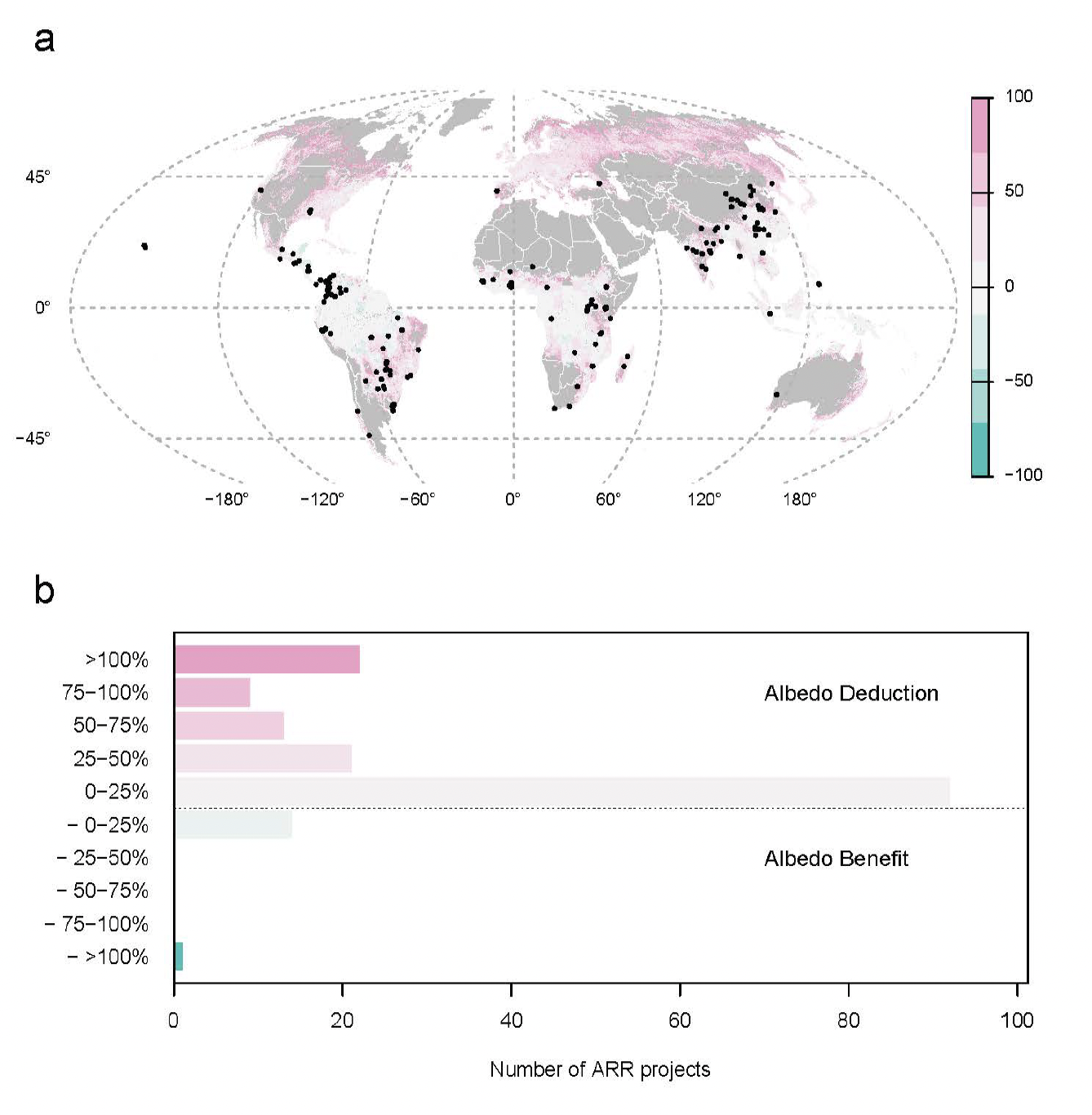New research shows how the albedo effect—Earth’s reflectivity—influences how well forest restoration projects can help cool the Earth.
The Gist
The study, which was published in Nature Communications and led by scientists from Oregon State University, the American Forest Foundation and The Nature Conservancy, looks at how changes in surface reflectivity (albedo) can affect the climate impact of forest-based carbon projects—sometimes even reversing their intended cooling effect.
By analyzing 172 Afforestation, Reforestation, and Revegetation (ARR) projects in the Voluntary Carbon Market (VCM), the study finds that over 10% of projects may have their climate benefits entirely negated by albedo effects, and 25% may see those benefits halved. In good news, researchers found that the majority of reforestation projects are located in areas where albedo changes are minimal, and 9% may actually gain additional climate benefit due to increased reflectivity.
“Tools for estimating albedo change appeared only recently,” notes co-author Susan Cook-Patton, lead forest restoration scientist at TNC. “So it is a pleasant surprise to see that by luck or good planning the majority of projects are places where albedo changes are not hugely concerning. But our study shows that enough projects occur in places where albedo changes need to be taken seriously. And we provide a tiered approach for improved climate accounting to ensure that we unlock nature’s greatest potential as a powerful ally in the fight against climate change.”

The Big Picture
Natural Climate Solutions (NCS) are a cornerstone of global climate mitigation strategies, and carbon markets are a key funding mechanism. Yet, current carbon crediting protocols focus almost exclusively on biochemical impacts—like CO₂ removal—while ignoring biophysical factors such as albedo, evapotranspiration and cloud formation. Albedo, in particular, can offset or even reverse the cooling effect of carbon sequestration, especially in regions where forest cover reduces surface reflectivity. Conversely, some projects, especially in tropical and subtropical regions, may offer uncredited albedo benefits, suggesting they’re even more climate-positive than currently recognized.
Using high-resolution Hasler data, the study quantifies albedo impacts across a global set of ARR projects. It finds that while many projects are appropriately sited, a significant portion may be over-credited due to unaccounted warming effects. The authors propose a four-tiered approach to incorporate albedo into carbon accounting:
- Tier 1: Use albedo data to guide project siting without affecting credit eligibility.
- Tier 2: Introduce thresholds (e.g., 50% or 100% albedo deduction) to exclude projects with high warming risk.
- Tier 3: Apply albedo-based discounts to credit volumes for eligible projects.
- Tier 4: Recognize and credit albedo benefits where applicable.
The framework is designed to be iterative and scalable, allowing for immediate, but conservative implementation while enabling more sophisticated accounting as science and data improve.
The study also highlights the need to consider other biophysical effects—like evapotranspiration and cloud cover—which may enhance or diminish climate benefits but are currently too uncertain to reliably quantify. The researchers call for further research and tool development to support holistic climate accounting.
The Takeaway
This study underscores the importance of integrating albedo into carbon market protocols to ensure that forest-based carbon projects deliver real and measurable climate benefits. It provides a practical roadmap for doing so, balancing scientific rigor with operational feasibility. The findings suggest that:
- Carbon credits may be significantly overestimated if albedo is ignored.
- Tiered albedo accounting can improve market integrity and help direct climate finance to the most effective projects.
- TNC and partners are leading the charge in advancing rigorous science to improve NCS outcomes and ensure that nature-based solutions are truly climate-positive.
By adopting albedo-informed protocols, the Voluntary Carbon Market can better align with the best available science, build trust among stakeholders, and maximize the impact of climate investments. This work is a critical step toward more transparent, accountable, and effective carbon markets.



